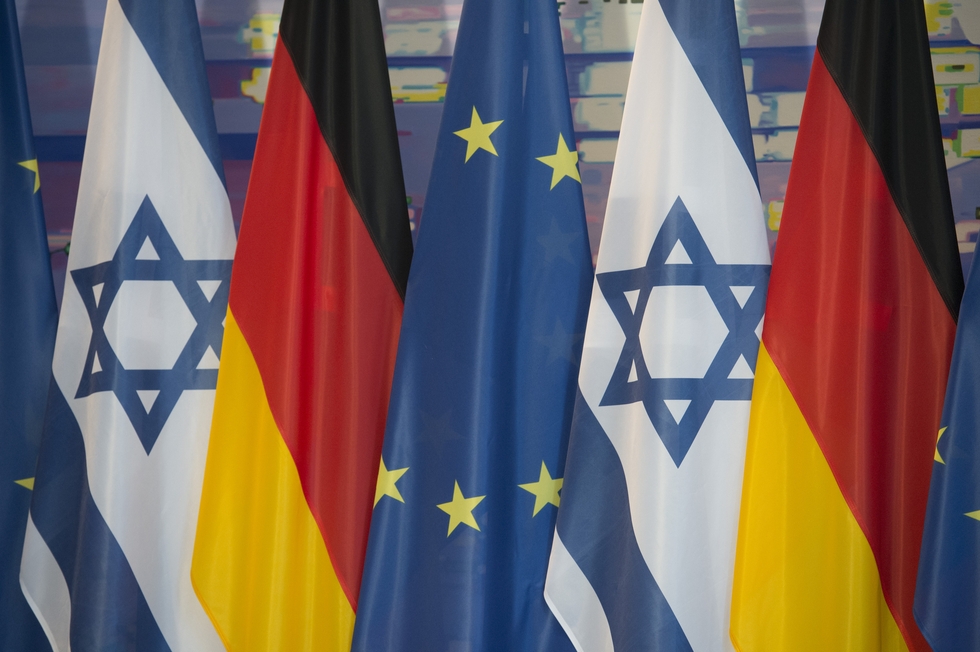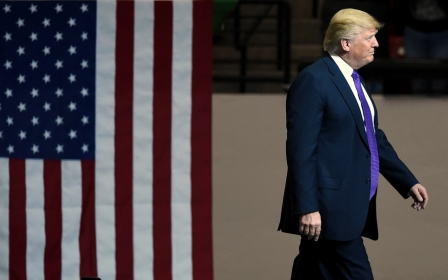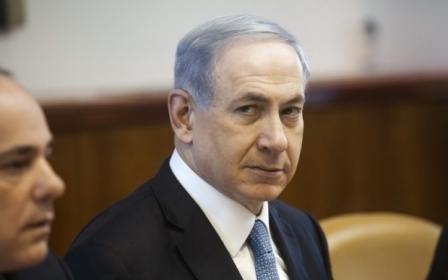Report claims links between EU pro-Israel lobby and 'Islamophobic' groups

Right-wing pro-Israel lobby groups have sought to establish a "firm presence" in Brussels to promote Israeli interests in EU states and suppress criticism of Israel's treatment of Palestinians, according to a report released in London Friday.
The investigation, conducted by UK-based campaigning organisation Public Interest Investigations/Spinwatch and published by the EuroPal Forum, says groups linked to "extremist settler" and "Islamophobic" movements in the US have made inroads in the seat of EU power.
The EuroPal Forum is a lobbying organisation advocating Palestinian rights and working to raise awareness about Palestinian issues.
The report says that a host of businessmen and activists have funded numerous organisations in Europe to press media into adopting pro-Israeli positions, lobby politicians and promote campaigns against Islamic extremism.
The report lists the Friends of Israel Initiative (FOII), AJC Transatlantic Institute, Israel Allies Caucus, European Foundation for Democracy and European Leadership Network as groups with "strong connections, both organisationally and through their funders, to the right-wing pro-Israel movement in the United States, which has Islamophobic tendencies and partnerships with extremist Israeli settlers".
The origins of the groups vary, from religious to secular. Some were set up only a few years ago, while others trace their heritage back decades, but all have joined the lobbying fray in the last few years, seemingly out of a common belief that public opinion across the EU was shifting away from Israel.
Spinwatch says these groups have joined and bolstered smaller set groups like European Friends of Israel, Europe Israel Press Association and European Coalition for Israel that have been lobbying Brussels since as early as 2003.
The report suggests the phenomenon is “a natural outgrowth of previously existing lobbies" within the EU.
It says ties between the EU and the various pro-Israel groups means that “the negative implications for a just peace in Israel and Palestine could not be more far reaching.”
"The influence of the Israel lobby in the US has been pretty well-documented by now," the report's co-author David Cronin told Middle East Eye. "We saw recently, for example, that most of the contenders in the presidential race felt that they had to attend a big conference of AIPAC, the leading pro-Israel group in Washington.
"By contrast, the Israel lobby in Europe has received very little scrutiny. This is despite how it has grown considerably over the past decade or so."
The report's authors note that the EU imposed no trade restrictions on Israel during the 2014 bombardment of the Gaza Strip in which 2,251 Palestinians were killed, including 1,462 civilians.
Cronin also said that a "smear campaign" had been launched in Brussels against the Palestinian solidarity movement in Europe.
"Under pressure from the pro-Israel lobby, the EU's Fundamental Rights Agency in Vienna has decided to consider calls for a boycott of Israel as anti-Semitic," he said. "This means that when the agency produces data on anti-Semitism, it is conflating robust criticism of Israel's state policies with a hatred of Jews.
"The agency's decision smacks of profound ignorance. The Palestine solidarity movement is a progressive one. It has explicitly rejected all forms of racial and religious discrimination, including Islamophobia and anti-Semitism. It urges a boycott of Israel as a state, not of individual Israelis."
The extent of the lobby’s influence is hotly contested. Relations between Israel and the EU were strained by the EU’s November decision to issue guidelines on labelling products from illegal Israeli settlements.
The move provoked an uproar in the Israeli government, with the foreign ministry announcing it was “surprised and even angered by the fact that the EU chooses to implement a double standard against Israel, while ignoring 200 territorial disputes taking place today around the world, including within [the EU] or right on [Israel’s] doorstep”.
During the fallout from the Islamic State-claimed bombings in Brussels in late March, Ofir Akunis, Israel’s minister of science, technology and space suggested that if the EU had spent more time focusing on “extremist Islamic terror” rather than occupation products, the bombings might have been prevented.
While the two remain strong trade partners, that trend does appear to be declining.
According to the UN Conference on Trade and Development (UNCTAD), foreign direct investment in Israel dropped by 46 percent between 2013 and 2014, while a study by the Rand Corporation study predicted that BDS could end up reducing Israel’s GDP “by one to two percent” annually over the next 10 years.
Activists claim that some European companies have already ceased operations in Israel because of BDS pressures, including French waste management company Veolia, which stopped activities in Israel in 2014, citing a need to focus "on areas where it can seize less capital intensive opportunities".
The report also points out that the EU has made certain deals and diplomatic upgrades conditional on continued peace talks between Israel and the Palestinians - such as when Israel applied for upgraded status within the EU in 2008.
Lobby aims
The report, however, claims that a number of the groups listed have actively campaigned against Palestinian causes, have sought to downplay allegations of human rights abuses, and have been making headway in policy-making circles.
Among the groups listed in the report, the Friends of Israel Initiative (FOII) - launched in Paris in May 2010 - sets out to counter "the unprecedented campaign of deligitimation against Israel waged by the enemies of the Jewish State and, perversely, supported by numerous international institutions," according to its website.
"Israel is a sovereign democracy which like all the others is, of course, capable of making mistakes. Nonetheless, this should not be used as an excuse to question Israel’s right to exist, its legitimacy, or its basic rights as an independent state," it says.
The organisation's head, former Spanish prime minister Jose Maria Aznar, previously wrote in the Times newspaper - whose owner News Corporation has Aznar as a board member - defending the Israeli response to the Mavi Marmara incident during which 10 activists were killed by the Israeli security forces while trying to break the siege of Gaza.
"In an ideal world, no state, let alone a recent ally of Israel such as Turkey, would have sponsored and organised a flotilla whose sole purpose was to create an impossible situation for Israel: making it choose between giving up its security policy and the naval blockade, or risking the wrath of the world," he wrote in 2010, following the incident.
Among the listed funders of the FOII is the Middle East Forum, a think-tank founded by political activist Daniel Pipes, who has been described by James Zogby of the Arab American Institute as having an "obsessive hatred of all things Muslim."
The European Coalition for Israel (EC4I), composed of Christian supporters of Israel, sets out to "show genuine Christian love and solidarity towards the nation of Israel".
"Israel is the only state that is considered a parliamentary democracy in the Middle East. Consequently, it shares the same fundamental understanding of and respect for human rights, religious freedoms, free economic trade, and freedom of expression as European nations," it says on its website.
The group was launched in 2003, based in Brussels and headed by Finnish journalist Tomas Sandell. The Spinwatch report claims that it is fundamentally opposed to a Palestinian state, saying the organisation believes such a state "violates the legitimate legal claims of the State of Israel with respect to Jerusalem and the West Bank".
Middle East Eye reached out to FOII, AJC Transatlantic and other organisations repeatedly but they had not responded to requests for comment at the time of publication
Tomas Sandell, of EC4I, told Middle East Eye that the objections of EC4I to a Palestinian state were not "religious objections" and that they could accept such a state if it met certain criteria.
"We do however claim that a future solution of Jerusalem cannot violate universal values such as religious freedom and other fundamental rights which we believe would be the result of a divided Jerusalem where would be the capital of an Islamic Palestinian state and was the case before 1967," he said.
"As for our influence in Brussels it is difficult for me to evaluate – but we do not have the financial means of the Palestinian lobby."
Hugh Lovatt, Israel/Palestine Project Coordinator at the European Council on Foreign Relations, told Middle East Eye that the real impact of the Israel lobby on the EU was mixed.
"One has to acknowledge that the dynamics in terms of influencing European decision-making on Israel are totally different to the US - in Europe we do not see any organisation that has the sort of influence that [American Israel Public Affairs Committee] AIPAC does, for example, on decision-making," he said. "There have been recent moves afoot on the side of the Israeli lobby to try to replicate the efforts that we see in the US."
He said that the strategy of Israel and pro-Israel lobbyists was to play "divide-and-conquer" and undermine consensus on issues such as a settlement labelling by pressuring specific European countries as a means of blocking progress on pro-Palestinian legslation.
"One shouldn't overestimate the impact of the lobbying activities," he said. "I think they can have an impact on public opinion, although they can never counteract the negative impact that Israeli actions in Gaza for example have on public opinion."
Middle East Eye propose une couverture et une analyse indépendantes et incomparables du Moyen-Orient, de l’Afrique du Nord et d’autres régions du monde. Pour en savoir plus sur la reprise de ce contenu et les frais qui s’appliquent, veuillez remplir ce formulaire [en anglais]. Pour en savoir plus sur MEE, cliquez ici [en anglais].




